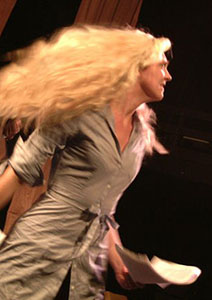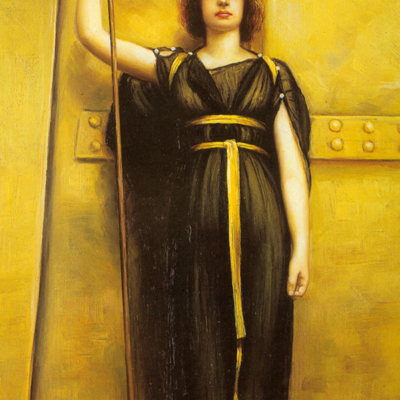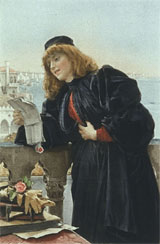Taming of the Shrew is a divisive play that is almost impossible to produce on a modern stage. But there are three things you need to understand about the play:
 First, Shakespeare was writing in a well-established “taming your wife with physically abusive comedy” genre that was very popular in Elizabethan theater. So, to some extent, you’ve basically got the script from one episode of Friends and you’re trying to produce it 400 years from now after everyone has forgotten what a sitcom is.
First, Shakespeare was writing in a well-established “taming your wife with physically abusive comedy” genre that was very popular in Elizabethan theater. So, to some extent, you’ve basically got the script from one episode of Friends and you’re trying to produce it 400 years from now after everyone has forgotten what a sitcom is.
Second, Shakespeare seems to be deliberately deconstructing the tropes of that “tame your wife” genre and using them to produce an incredibly progressive criticism of it. (People often look at Taming of the Shrew and ask how the guy who would create Beatrice and Lady Macbeth and Rosalind and so many other strong, independent female characters just a few years later could write this play. But if you read the play carefully, you’ll notice a lot of fascinating parallels between Kate and Beatrice. And then you’ll notice even more between Bianca and Hero. And at that point you’ll start figuring out how this play actually ticks.)
Third, the problem is that Shakespeare’s “incredibly progressive criticism” is, nonetheless, regressively conservative to a modern audience. (It reminds me of a list of “Offensive Boardgames” I saw awhile back that included a 1966 game called Career Girls in which women picked careers from a limited list featuring stuff like teachers, stewardesses, actresses, nurses, and so forth. By modern standards that would be horrible. In 1966, the idea of women pursuing independent careers instead of staying at home was radical all by itself.) So while I think describing the play as misogynistic is unfair given its context within the time period it was written, I don’t think it’s a text that lends itself well to modern production. You’ll probably need to resort to priming your audience through program notes.
This is the key to understanding the play: Kate lives in a world of boorish, cruel men who routinely mock her intelligence and reject her emotional advances in favor of her beautiful sister. (The first mistake most productions make is to assume that Kate doesn’t want to be married; but her first two scenes reveal quite the opposite.)
When Petruchio shows up, the obstacle he faces is that Kate has raised all of these walls to defend herself. He has to break through those walls and convince her that he’s a Benedick to her Beatrice; that they can play together and not fight each other. Look at the first thing he says to her (paraphrased): “I have heard the people here in Padua call you many things, but I don’t believe any of them. Take my hand, Kate.”
It doesn’t work: Kate’s defenses are up and the verbal cat-and-mouse begins.
(I then strongly, strongly recommend that you ditch the common choice of having Petruchio grab Kate and force her to sit on his lap. It’s not supported by the text. Let the language play, possibly have him grab her hand to stop her from leaving, and then have her slap him. You can’t have “I swear I’ll cuff you, if you strike again” be hypocrisy if you have any hope of a modern audience accepting the play.)
The key quote here is: “Why does the world report that Kate doth limp? O slanderous world! … O let me see thee walk.” And then, despite the fact that she’s been trying to leave for several lines, Kate doesn’t leave. There’s a crack there… but then the Padua men come in and she locks it down again.
The most effective productions I’ve seen then present Petruchio’s later behavior (all the stuff with dishes and dresses and so forth) as a deliberate satire of Kate’s earlier behavior. (Remember that she was literally binding and beating her sister.) And so when you get to “Evermore cross’d and cross’d; nothing but cross’d!” Kate suddenly sees the trap she’s weaved for herself in the trap Petruchio has satirized to her.
And then… oh then! They get to play together! Don’t cut the old man who is taken for a maid stuff because you can’t find an actor for it: That’s the pay-off! That’s the bit where all the pain is worth it because they’ve suddenly discovered that, when they work together, they can mock all the world. Play the mutual joy of it.
For the finale, of course, they go back to Padua and play a long con on all the people Kate vowed vengeance against at the beginning of the play. (The important note here is that the first thing that Petruchio does with his “mastery”, which is really partnership, is to help Kate realize her goal.)


 When Shakespeare sat down to write The Merchant of Venice, he was tapping into the well-established Elizabethan genre of the “Jewish Villain”. After The Merchant of Venice itself, Marlowe’s The Jew of Malta is the most famous example of the genre, but it was only one among a dozen or more plays of the same type which had been written in the 1580’s and early 1590’s.
When Shakespeare sat down to write The Merchant of Venice, he was tapping into the well-established Elizabethan genre of the “Jewish Villain”. After The Merchant of Venice itself, Marlowe’s The Jew of Malta is the most famous example of the genre, but it was only one among a dozen or more plays of the same type which had been written in the 1580’s and early 1590’s.









